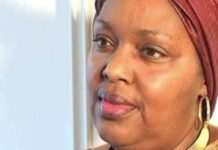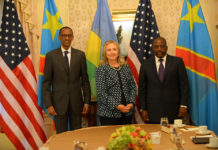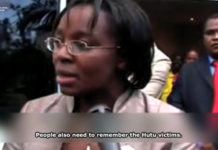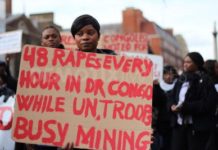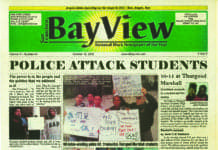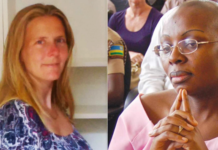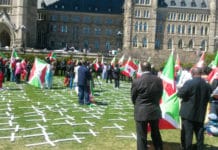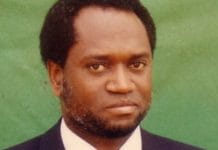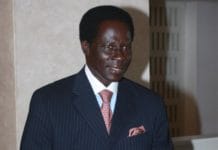
by Ann Garrison
On May 26, I interviewed opposition leader Victoire Ingabire. Our exchanges were transmitted electronically between my home in the San Francisco Bay Area and hers in Kigali, the capital of Rwanda.
Ann Garrison: Victoire, I received a press release from your supporters in Europe which said that someone called a TV channel there in Kigali – Channel 250 – to say that you should be “arrested at least and killed at best.” This doesn’t sound good.
Victoire Ingabire: Yes, I heard this message on “My 250 TV.” My lawyer is preparing a complaint, but I have meanwhile informed the Rwandan Investigation Bureau.
AG: That’s the same investigation bureau that keeps calling you in for questioning, right? Sometimes leaving you to sit in a chair in a room all day by yourself?
VI: Yes, but it is their job to protect all the people of Rwanda.
AG: There has been another murder. Nine armed men killed Pastor Theoneste Bapfakurera when they mistook him for shopkeeper Theophile Ntirutwa, a member of your opposition party. Tell us about that.
VI: Yes, on Monday, May, 11, 2020, nine armed men attacked the shop of Theophile Ntirutwa, a member of my political party. They stabbed to death a customer, Theoneste Bapfakurera, and tied up other customers who were in the shop.
Theophile had time to hide under the counter when the attackers pushed people into his shop. He immediately called me and I gave him the police number to call for help.
He told me that attackers arrived in the neighborhood and asked an elderly man to bring them to where his sister lived. Once there, they asked his sister to bring them to his shop. The people in this neighborhood said that the assailants asked them to switch off the lights. So when they entered Theophile’s shop, they asked, “Who is Theo?” and Pastor Theoneste answered that he was. Then they killed him and left the shop believing they had accomplished their mission even though they had killed another Theo.
AG: So many of your party members have been murdered or disappeared since your release from prison in September 2018 that I can’t remember them all. So, rather than go back through previous reports, I’ll ask you to tell me their names and what happened to them again.

VI: Yes, you are right. Since my release many members of my former party, United Democratic Forces of Rwanda (FDU-Inkingi) were killed, as were members of my new party, Development and Liberty for All-Umirinzi.
Remember that I left FDU-INKINGi to create the new party Development and Liberty for All-Umurinzi, not because of disagreements with FDU, but because FDU is largely a party of exiles and refugees outside Rwanda, and Rwandans living here need their own party.
There were also killings and disappearances of members of FDU, in 2016, two years before I was released. That year Jean Damascène Habarugira’s throat was cut.
Also in 2016, Illuminée Iragena went missing and has never been found.
It became worse after my release on Sept. 15, 2018. On Oct. 8, 2018, our FDU Vice President Boniface Twagirimana went missing. He had been in prison in Muhanga, and authorities reported that he had escaped, but we never saw or heard from him again.
On March 3, 2019, my assistant Anselme Mutuyimana was killed and his body dropped in the forest of Gishwati.
On July 15, 2019, Eugene Ndereyimana, our representative in the east of our country, disappeared and has never been found. He was on his way to meet new members of our party DALFA- Umurinzi 50 kilometers away from his home.
In the evening of Sept. 24, 2019, when Syldion Dusabumuremyi was preparing to close his canteen in the Shyogwe Hospital, he was stabbed by two men who arrived and then disappeared on a motorbike.
None of these cases have been resolved. The Rwanda Investigation Bureau still lists them as pending.
AG: Has violence against dissenters gotten worse since your release, or is it just that it was not being reported when you were in prison, between October 2010 to September 2018?
VI: It got worse after my release, but dissidents were murdered or disappeared back in 2010 when three candidates, including myself, attempted to register our parties and run against Paul Kagame in that year’s presidential election.
AG: I have received press releases about these political assassinations from your party there in Kigali and from the United Democratic Forces of Rwanda, an opposition party in exile that you also belong to. Are members of other opposition parties, like the Partí Social Imberakuri led by formerly imprisoned attorney Bernard Ntaganda, being killed as well?
VI: Yes. André Rwisereka, vice president of the Democratic Green Party of Rwanda, was found with his throat slit by the banks of a river in 2010. His wallet, car keys and car were left at the scene of the crime.
Also that year, Aimable Rusangwa, secretary to attorney Bernard Ntaganda, founder and president of the socialist party, Partí Social Imberakuri (PS-Imberakuri), was murdered.
Shyirambere Dominique and Nigirente James, both members of PS-Imberakuri, have been missing for years, Shyirambere since 2012, Nigirente since 2015.

And in mid-February this year, authorities told us that our dear friend Kizito Mihigo, Rwandan gospel singer and reconciliation activist, had killed himself in prison. That was after they arrested him trying to cross our southern border into Burundi. Very few believe that Kizito committed suicide.
So long as Rwanda is not democratic, the repression and violence against dissidents and opposition parties will continue.
AG: The violence in the Democratic Republic of Congo’s Kivu Provinces, particularly Beni Territory and Virunga National Park, has been worsening again at the same time that this violence has occurred in Rwanda. Sources I find credible believe that Rwandan troops – whatever sort of “rebels” they may call themselves in DRC – are responsible. Is there anything you’d like to say about the violence in the Kivus?
VI: I find it deplorable that more than two decades of war and horrific human rights abuse have been tolerated in eastern DRC, most of all in the Kivu Provinces bordering Rwanda and Uganda. Everyone knows who is and is not involved in this violence, but because of the interests of a few people, no one comes to rescue the people.
Whenever the opportunity arises, I condemn this violence, and I ask the UN Security Council to assume its responsibility and put an end to it. Enough is enough. Since 1998 I have never ceased to speak out about the impunity that is the cause of ongoing violence and instability in DRC and the rest of the African Great Lakes Region.
I want to repeat my appeal to the UN Security Council to do something regarding the instability in the eastern Democratic Republic of Congo (DRC). But I also call for African solidarity.
AG: For years the Rwandan government, various NGOs and international media have blamed the violence in the Kivus on the Democratic Forces for the Liberation of Rwanda (FDLR), the militia protecting Hutu refugees of the 1994 genocide who remain in DRC. I thought this had begun to change, but at the end of April, the Virunga National Park press office blamed the massacre of 12 park rangers and five civilians on the FDLR, who then issued a statement denying that and accusing Rwandan government forces instead.
I asked the press office for their evidence that the FDLR were responsible and they promised to respond several times but never did. Is there anything you’d like to say about that?
VI: No, nothing.
AG: According to the FDU press release, ruling party officials have compared you to Ebola, “having sucked genocidal ideology from her [your] mum’s breasts.” The release also says that Gen. James Kabarebe, former army chief of staff and now special security advisor to President Kagame, made an inflammatory speech on Nov. 13, 2019, in which he said, “I hate her because I see 1 million victims in one person with genocidal ideology. She is awfully bad. I think that if you want to hit her, you may need to use the most lethal weapon. We have to be sure that she is dead.” Is there anything you’d like to say about that hideous statement?
VI: Gen. Kabarebe did not say anything like that regarding me, or, if he did, I did not hear it, so I cannot comment on it.
AG: Is there anything else you’d like to say?
VI: I want to repeat my appeal to the UN Security Council to do something regarding the instability in the eastern Democratic Republic of Congo (DRC). But I also call for African solidarity.
Yesterday we were celebrating 57 years of independence in Africa, but what sort of independence is this when a war goes on and on in DRC, costing millions of lives, because other African nations invaded, and no one does anything to stop it? Where are the Pan-Africanists?
Regarding Rwanda, I call on its donors to press Rwandan authorities to open political space and help us establish the rule of law in our country. The largest bilateral donors are the US and the UK, but the World Bank, the Fund for Global Health and the EU are ahead of them in that order.
AG: Thank you, Victoire.
VI: Thank you, Ann.
Ann Garrison is an independent journalist based in the San Francisco Bay Area. In 2014, she received the Victoire Ingabire Umuhoza Democracy and Peace Prize for her reporting on conflict in the African Great Lakes region. Please support her work on Patreon. She can be reached at ann@anngarrison.com.

 Store
Store



